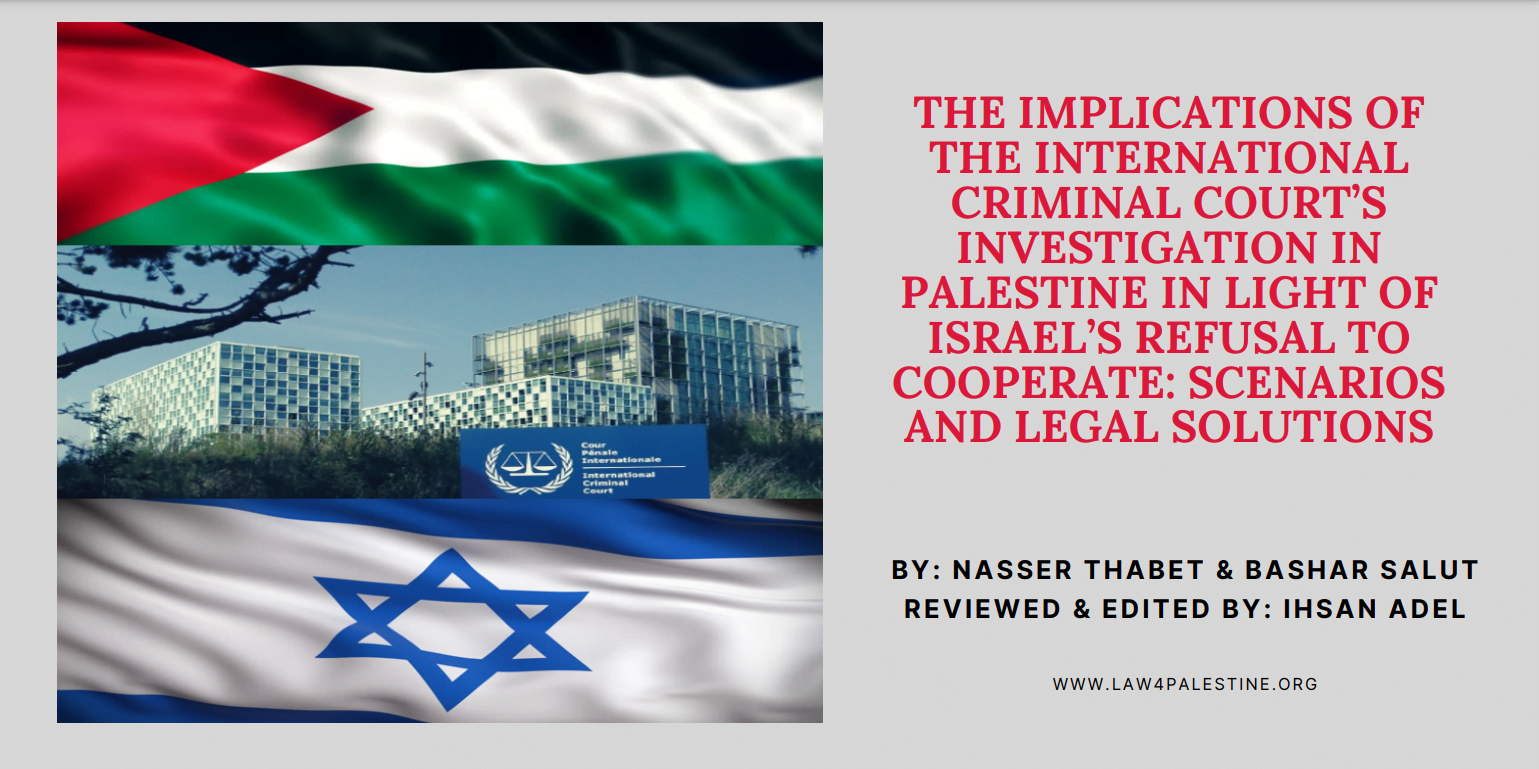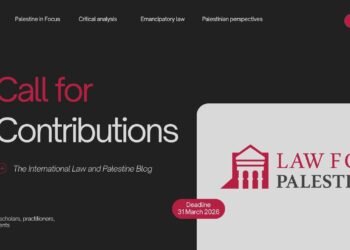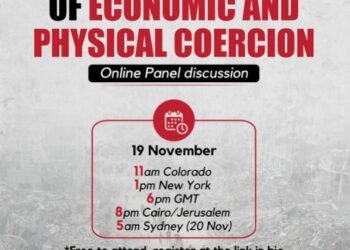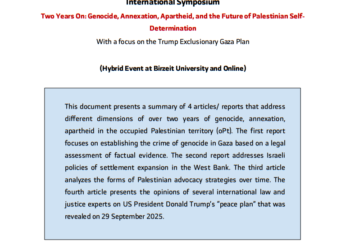The Implications of the International Criminal Court’s Investigation in Palestine in Light of Israel’s Refusal to Cooperate: Scenarios and Legal Solutions ICC Israel Scenarios
By: Nasser Thabet and Bashar Salut
Reviewed and Edited by: Ihsan Adel
Translated by: Karim Assaf
Edited by: Hassan Ben Imran
* To download the paper in pdf format, click here (11 pages)*
Introduction
After years of legal controversy following the State of Palestine’s accession to the International Criminal Court in 2015, the situation in Palestine was referred to the Court in order to investigate the Israeli authorities’ crimes. The Court’s Prosecutor decided on March 3, 2021, to open an investigation into international crimes committed within the territories of the State of Palestine, which includes the West Bank, East Jerusalem, and the Gaza Strip.
In its quest to move forward with the investigation, the ICC – through then Public Prosecutor, Fatou Bensouda – sent a letter to the Israeli government asking it to cooperate regarding the investigation, but the latter explicitly declared its unwillingness to cooperate, on the grounds that the ICC does not have any authority to conduct investigations into the situation in the Palestinian territories and Israel.
In light of this, the question arises about the consequences of this Israeli refusal on the legal track to investigate the crimes that Israel is believed to have committed before the International Criminal Court. Does this represent a new challenge for Palestine? And how will Karim Khan, the ICC’s new prosecutor, deal with this matter, and how will he investigate the cases that he is supposed to start working on in light of the Israeli refusal? What legal mechanisms the Court can employ to help its investigations in light of this refusal? This is what this article is aiming to address.
First: The International Criminal Court’s address to Israel
On March 17, 2021, the International Criminal Court sent a special letter to the Israeli government accusing Israel of committing war crimes in the Occupied Palestinian Territories, allowing it 30 days to respond to this declaration or letter. Although the Court did not authorize the content of this letter, which consisted of a page and a half – according to what was published by “Israeli Channel 13” – presenting the three main areas of investigation: the war on the Gaza Strip in 2014, the Israeli settlement policy, and the peaceful protests on the Gaza border in 2018.
This letter comes after the Public Prosecutor of the Court officially announced on March 3, 2021, that she had opened an investigation into the situation in Palestine. In accordance with Article No. (18) of the Rome Statute, which regulates the issue of preliminary decisions on admissibility, the Prosecutor is required to notify all State Parties and other States that, in light of the available information, that the Court would normally exercise its jurisdiction over the crimes in question. The Prosecutor may also notify these states secretly (which is what happened in the case of this letter).
Within one month of receiving such a notice, the State in question may inform the Court that it is conducting or has conducted an investigation into the crimes committed by its nationals or others within its jurisdiction in relation to criminal acts that may constitute offenses within the Court’s jurisdiction and are relevant to the information provided in the notice to the State. At the request of that State, the Prosecutor shall waive the investigation of such persons, unless the Pre-Trial Chamber decides to authorize the investigation at the request of the Prosecutor.
Refusal to cooperate: An extension of the Israeli rejectionism towards the International Criminal Court
The Israeli response to this letter came through an official rejection of the letter of the Office of the Prosecutor of the International Criminal Court, following extensive consultations by Israel, the last of which was: “adopting the recommendations of the ministerial team headed by the Council of Ministers.” Israeli National Security, which recommended not to cooperate with the Court, while not leaving the prosecutor’s letter unanswered, but rather responding to it and clarifying that the Court is acting without competence, and that Israel is based on the rule of law and can conduct internal investigations on its own.
It is worth noting that Israel’s rejection of the Prosecutor’s letter is not something new, and it was quite consistent with Israeli rejectionist position towards the Court since the very beginning. This was evident from the first moments when Palestine headed to the Court, and its position was manifested in a torrent of statements whenever Palestine made any progress in the corridors of the Court. Additionally, Israeli rejectionism was reinforced by the major diplomatic pressure it exerted over its ally, the United States of America. The US administration resorted to several tactics to demotivate, or more accurately threaten, the Palestinian Authority in order to stop what they considered as unilateral steps. The tactics included the sanctions the former President Donald Trump had imposed on some Court employees, including the Prosecutor herself.
For the purposes of documentation, we review the Israeli rejectionist approach toward the International Criminal Court, as follows:
- January 2009: Palestine had its first attempt knocking the door of the International Criminal Court, following Operation Cast Lead – the large-scale military operation launched by Israel on the Gaza Strip (ending in January 2009). The first attempt to join the Court was unsuccessful, because Palestine’s status as a state-entity was not clear yet. Subsequently, in 2012 the PLO went to the United Nations, and on November 29, 2012 it obtained the status of a non-member observer state at the United Nations. Despite obtaining the new status, which would pave the way to join the ICC, Palestine did not head again towards the Court until 2015 due to the pressure exerted by Israel and the United States of America on the Palestinian leadership to refrain from any ‘unilateral’ action.
- January 2015: Palestine deposited a declaration under Article (12/3) of the Rome Statute, accepting the jurisdiction of the International Criminal Court regarding the crimes allegedly committed in the occupied Palestinian territory since June, 13 2014. The following day it deposited an application to ratify the Rome Statute to the Court and the Secretary-General of the United Nations, to which the Court responded by declaring its acceptance of Palestine’s request, followed by the Prosecutor’s announcement that she had embarked on a preliminary examination of the “situation in Palestine.” Israel rejected this step, and the Israeli Prime Minister, Benjamin Netanyahu, accused the International Criminal Court of “hypocrisy” and expressed Israel’s clear refusal to deal with the court, stating that “Israel will not allow its soldiers to appear before the court.”
- December 20, 2019: after almost five years, the Prosecutor issued a statement declaring that she had concluded the preliminary examination of the “situation in Palestine”, declaring that “all legal criteria under the Rome Statute regarding the opening of an investigation have been met”, and requested that the Pre-Trial Chamber issue a Judicial Judgment on “the Territorial Scope of the International Criminal Court under Article 12(2)(a) of the Rome Statute in Palestine.” On the same day that the Prosecutor announced the conclusion of the Pre-Trial Chamber’s decision, Israel expressed its legal position through a legal memorandum, issued by the Israeli Attorney General, in which it objected to the decision claiming that the Court lacks jurisdiction as Palestine is not a state, considering that it lacks the element of effective control over the territory. It argued further that this matter is to be settled within the framework of Oslo Accords through negotiations between the parties. The then Israeli Prime Minister, Benjamin Netanyahu, also expressed his rejection of the Prosecutor’s decision claiming that the court has no jurisdiction to investigate allegations of war crimes in the Palestinian territories, describing it as a “dark day for truth and justice”.
- Following the Prosecutor’s request for Pre-Trial Chamber I to determine the territorial jurisdiction, Pre-Trial Chamber I of the Court asked Palestine, Israel, victims, other States, organizations and/or persons, as amicus curiae, to submit memoranda before the Court regarding the aforementioned Prosecutor’s request. Nevertheless, on the official level, Israel refused to deal with the Court and has not submitted any legal submissions directly to the Court. However, it seemed to have adopted an unofficial approach by inviting academics, the Israeli Bar Association and civil society organizations supporting Israel to submit their memoranda.[1] For example, the paper submitted by the International Association of Jewish Lawyers and Jurists (IJL)focused on refuting the legal basis on which the Public Prosecutor relied on in discussing the territorial jurisdiction of the Court; an argument the Israeli officials keep bringing up. Israel’s efforts also included enlisting the support of a number of member states to the Court to submit memoranda to the court in the same context. Israel’s argument in this regard is its denial of the very statehood of Palestine, within the meaning of the Rome Statute. In addition, the administration of former US President Donald Trump during that period imposed a set of sanctions on a number of Court employees, including freezing their assets and preventing them from entering US territory.
Israel refused to deal with the Court and has not submitted any legal submissions directly to the Court. However, it seemed to have adopted an unofficial approach by inviting academics, the Israeli Bar Association and civil society organizations submit their memoranda
- On March 3, 2021, when the former Prosecutor officially announced that she had opened an investigation into the “situation in Palestine”, the Pre-Trial Chamber I issued its decision regarding the Court’s territorial jurisdiction in the West Bank, including East Jerusalem, and the Gaza Strip. Israel again rejected this decision calling it “an anti-Semitic measure”, in the words of its then Prime Minister Benjamin Netanyahu. Likewise, the Israeli Foreign Minister, Gabi Ashkenazi, accused the Court of bias, claiming that “the ICC’s decision distorts international law and turns this institution into a political tool for anti-Israel propaganda.”
Second: What are the consequences of the Israeli rejectionist approach towards the Court?
It should be noted, first of all, that Israel is a non-Party State to the Rome Statute. However, the Court exercised its jurisdiction based on a referral from the State of Palestine, a State Party to the Rome Statute, which allowed the Court, under Article 12 of the Statute, to investigate alleged crimes committed in the territory of the State of Palestine, regardless of the nationality of the perpetrator. Based on that, the actions of Israeli officials in Gaza and the West Bank fall within the jurisdiction of the Court.
In light of the Israeli refusal to investigate the alleged crimes itself or cooperate with the ICC, what are the scenarios that are envisaged to occur in the investigation conducted by the Court? Here we present five scenarios:
- (Scenario I: Israel cooperates and accepts the investigation’s normal course of action): This scenario envisages that the international community and the United Nations bodies will exert pressure on the Israeli authorities to cooperate with the Court. The change of the Court’s Prosecutor and the appointment of the new Prosecutor Karim Khan may push Israel to re-evaluate its rejectionist position towards the Court, considering the damage on the image Israel would suffer if they continue to reject the course of international justice and appear as a fugitive from justice.
In fact, this scenario is highly unlikely to happen considering the firm Israeli rejectionism of the Court and its jurisdiction from the very beginning. Besides, Israel refuses to recognize the statehood of Palestine and it may be concerned that dealing with the case would count as implicit recognition. This official Israeli stance is supported by some sort of internal consensus as well as by American full support in this matter.
- (Scenario II: The Prosecutor retracts the investigation): Faced with the fact that the new Prosecutor of the Court and his office personnel are unable to enter the Palestinian territories to conduct investigations and prosecute the alleged criminals, in light of Israel’s absolute control over the entry points to the West Bank, including East Jerusalem, Without the Gaza Strip controlling its southern crossing by the Palestinian and Egyptian authorities, in light of this, the Prosecutor may resort to suspending the investigation until circumstances change, in accordance with paragraphs 1 and 2 of Article 53 of the Rome Statute.
It should be noted here that the appointment of the new Prosecutor, Karim Khan, is met with skepticism and doubts whether he would reverse the previous Prosecutor’s decision to open an investigation into alleged crimes in Palestine.
In this regard, the former US ambassador for war crimes, Stephen Rapp, notes that the attorney general can always move forward “without effective state support”, as happened in Sudan and Libya, but he admits that this “was not very successful”, as it would be difficult to build a strong case leading to trial.
If this happens, in accordance with Article 53/3/a of the Rome Statute, the State of Palestine has the right to appeal the decision of the Prosecutor before the Pre-Trial Chamber.
- (Scenario III: Security Council intervenes to defer the investigation): The UN Security Council may intervene to postpone the investigation for a period of 12 months, renewable indefinitely afterwards, based on Article 16 of the Statute. UNSC may build its case on the grounds that the investigation could affect international peace and security, in light of Israel’s refusal to deal with the Court. In fact, the Security Council has never taken such a measure from the inception of the Court, and neither did the Council, nor its permanent members, have indicated their intention to postpone the investigation on the situation in Palestine, especially that the Court’s decision would be in line of the UNSC resolutions regarding the issue, particularly Israeli settlements in the OPT. The US former ambassador for war crimes, Stephen Rapp, describes such a step, if taken, to be “setting a dangerous precedent.” Another reason to believe this scenario is unlikely is the previous failure of the US to grant immunity to its soldiers, serving in peacekeeping forces in the Balkans, from appearing before the International Criminal Court, invoking Article 16 of the Statute. The American request was met by an overwhelming opposition from the Council members.
- (Scenario IV: The court suspends the investigation due to Israel’s initiation of investigation): As Israel begins to investigate the crimes committed, and exercises its jurisdiction over the crimes that were actually committed, the Court and its Prosecutor decide to stop the investigation, taking into consideration the principle of complementary jurisdiction as in Articles 1, 7, 20 of the Statute; that the Court’s jurisdiction is complementary to national criminal jurisdictions. In fact, this scenario is highly unlikely for several reasons, including the fact that some crimes, settlements in particular, are a part of Israel’s fundamental public policy and identity, stipulated and enshrined in the Israeli Basic Law(Nation State Bill) as a duty of the state. This means that should Israel decide to initiate an investigation, it must investigate the crime of settlement, and hold all individuals that promoted the commission of this crime to account; needless to say, most of whom would be key state figures. It is safe to say that this is completely unimaginable. Moreover, even if Israel conducts an investigation, that would not prevent the Court from examining the extent of Israel’s seriousness in these investigations, including the fairness of the procedures, in accordance with the provisions of Article 17 of the Rome Statute.
- (Scenario V: The Court proceeds with the investigation): This is the scenario we believe is most likely to take place. However, how can the Court proceed to investigate in light of Israel’s lack of cooperation? This is what we discuss in the remaining part of the paper.
Third: What legal mechanisms does the Court have to conduct investigations in light of the Israeli refusal to cooperate?
Israel’s non-cooperation with the Court raises two main dilemmas, namely:
- The Court’s inability to reach the Palestinian territories to gather the necessary information and examine the facts.
- The Court’s inability to reach the accused, given the presence of Israeli leaders in Israel and occupied Palestine.
We will deal with these two issues separately in the following lines.
Overcoming the obstacle of collecting the necessary information from the West Bank and East Jerusalem:
First of all, let’s agree that Israel’s refusal to cooperate means the inability of the Court’s Prosecutor’s office to reach the West Bank and East Jerusalem, in other words the inability to closely follow the settlement issue. However, visiting the Gaza Strip will often be possible, through Egypt, who despite being a non-party to the Rome Statute, can cooperate based on a request for cooperation under Title IX of the Rome Statute. Thus, the problem remains the Court’s inability to gather the necessary information from the West Bank and East Jerusalem.
In 2014, the United Nations Independent Commission of Inquiry on the Gaza Conflict– established based on Human Rights Council Resolution A/HRC/RES/S-21/1 to consider all violations of IHL and Human rights in the Occupied Palestinian Territory, especially the Gaza Strip – faced this problem. The Commission was denied entry by Israel to inquire the alleged violations of human rights and IHL in the Israeli military operation carried out against Gaza in July-August 2014.The Commission had to come up with practical solutions, so it started gathering the needed information through interviewing a number of victims, from both the West Bank and Gaza, receiving treatment in the Jordanian capital, Amman. The Commission also interviewed large number of witnesses there.
The Prosecutor may choose the appropriate method for collecting information on crimes and accused persons, such as delegating the task of collecting information for the investigation to human rights institutions in the Palestinian territories.
The Commission also used audio-visual technology to conduct numerous interviews with a wide range of witnesses and victims in the occupied Palestinian territories. In addition, a number of witnesses and NGOs traveled to Geneva to testify before the Commission. Several human rights reports were submitted to the Commission by relevant local and international organizations.
Thus, denying the commission entry into the territories did not constitute an obstacle to reaching the victims and gathering information on the committed crimes. The Rules and Procedures’ Annex of the Rome Statute under Article (67) mentioned the possibility for the International Criminal Court and its Public Prosecution Office to rely on the use of video or audio communication technology in communicating with victims and collecting information from them.
The Court can also, under Article 87 of the Rome Statute, request cooperation from states parties, and conclude a cooperation agreement with a non-party state, and it can request any intergovernmental organization, such as the UN bodies, previous commissions of inquiry and other international organizations, to provide information or documents. Furthermore, given the inability of Palestine to cooperate with the Court given its lack of effective authority on the ground, the Prosecutor can resort to Article 57/3/d of the Rome Statute, which allows the Pre-Trial Chamber to authorize the Prosecutor to take specific investigative steps within Territory of the State of Palestine. It is understood from this that the Prosecutor, after obtaining permission from the Pre-Trial Chamber, may choose the appropriate method for collecting information on crimes and accused persons, such as delegating the task of collecting information for the investigation to human rights institutions or other internal bodies in the Palestinian territories, or by appointing a representative in the Palestinian territories.
Overcoming the obstacle to extradition:
In accordance with Chapter Nine of the Rome Statute, the Court may, for the purposes of carrying out its work, request assistance from the States Parties to the Rome Statute.[2]That is done through implementing the decisions and memoranda issued by the Court; On the grounds that the court is a judicial institution, and does not have its own police force or executive body. Thus, it depends fundamentally on the cooperation of the State Parties to the Court.
Accordingly, the Office of the Prosecutor of the ICC may issue arrest warrants against any Israeli citizen who is proven to be involved in committing international crimes described in the Rome Statute. Once such subpoenas are issued, it is the duty of the State Parties to arrest and surrender him/her to the Court, based on the Statute’s Article (59), paragraph (7) that states: “Once ordered to be surrendered by the custodial State, the person shall be delivered to the Court as soon as possible.” Furthermore, the Court has the power to direct requests for cooperation to international organizations, which include the International Criminal Police Organization (Interpol), which would help it implement such memoranda and warrants, in accordance with Article (87/2) of the Rome Statute, and in accordance with the cooperation agreement linking non-party states to the International Criminal Court.
In fact, it was international cooperation that brought perpetrators of international crimes to the Court in many cases, such as France, which cooperated with the Court pursuant to its obligation to provide cooperation and assistance stipulated in the Rome Statute, in at least two cases; the first case: The arrest of the accused, Calquist Mbarushimana, Executive Secretary of the Democratic Forces for the Liberation of Rwanda, in implementation of an arrest warrant issued against him by the International Criminal Court for war crimes and crimes against humanity in the Kivu provinces of the Congo, and the second case: the arrest of “Patrice Edward Ngaisona”, The leader of the Christian militia known as Anti-balaka, accused of war crimes and crimes against humanity, in the western side of the Central African Republic.
At the same time, there are cases where international cooperation has not succeeded, as was the case of former Sudanese President Omar al-Bashir during his visit to Chad. Chad did not arrest Al-Bashir, and neither did Jordan later on, although they are parties to the Rome Statute, which obliges states to cooperate with the Court in implementing arrest warrants.
It is true that the lack of international cooperation in the case of Palestine is highly probable, and on purely political considerations, which would be an obstacle to handing over to the Court Israeli persons against whom arrest warrants would have been issued. However, this will put a great deal of pressure on those countries, threatening them to be included in the category of concealment of the crime and covering up the perpetrators of international crimes; an accusation these countries would not be keen to have, and would reasonably try to avoid.
Conclusion ICC Israel Scenarios
Despite the legal and realistic challenges created by the Israeli refusal to cooperate with the Court, the Court still has legal and procedural mechanisms and dynamics that would provide a reasonable alternative to the normal course of actions that may be taken in ordinary cases, especially when taken together with its ability to cooperate with the State Parties, international organizations and other parties that it deems appropriate. Certainly, the Court still keeps the door open for Israel to cooperate, which would give it a last chance to defend itself against the accusations provided, but as for the moment, it is still persistent in its rejectionist approach.
______________________
[1]Namely The Lawfare Project/The Institute for NGO Research/Palestinian Media Watch /The Jerusalem Center for Public Affairs / ShuratHaDin / UK Lawyers for Israel / B’nai B’rith UK / International Legal Forum / Jerusalem Initiative / Simon Wiesenthal Centre.
[2]The number of states party to the Rome Statute is about 123. See: Assembly of States Parties, International Criminal Court, https://cutt.us/U8GfF
* Law for Palestine bears no responsibility for the content of the articles published on its website. The views and opinions expressed in these articles are those of the authors and do not necessarily reflect the official policy or position of the Organisation. All writers are encouraged to freely and openly exchange their views and enrich existing debates based on mutual respect.





